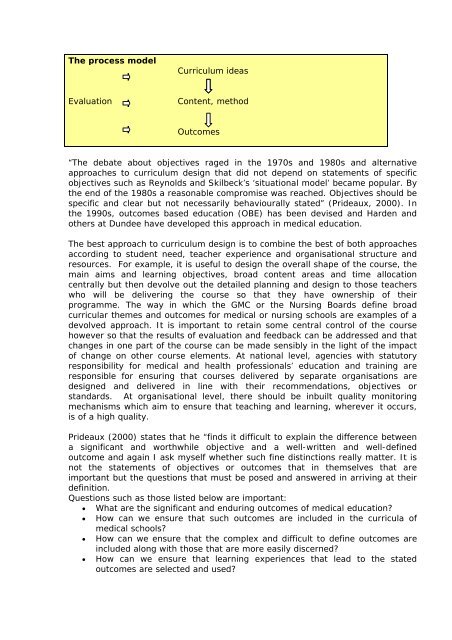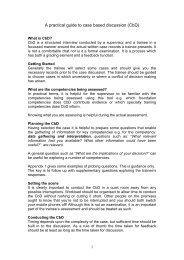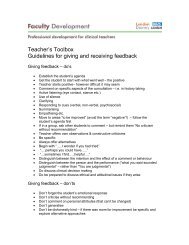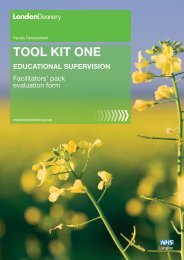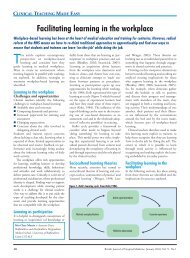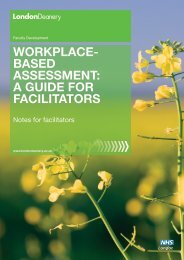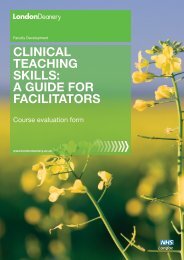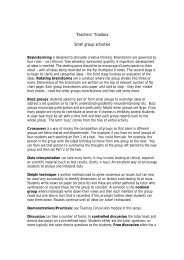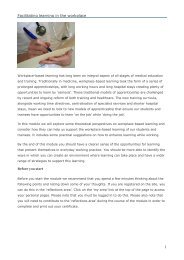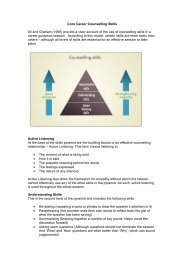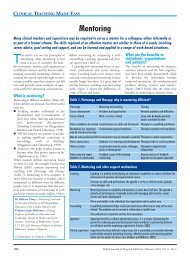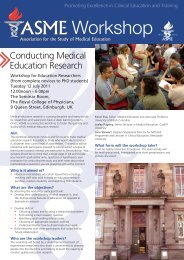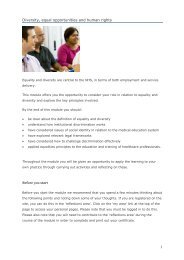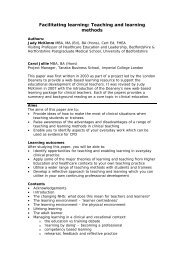Curriculum development module - Faculty Development - London ...
Curriculum development module - Faculty Development - London ...
Curriculum development module - Faculty Development - London ...
You also want an ePaper? Increase the reach of your titles
YUMPU automatically turns print PDFs into web optimized ePapers that Google loves.
The process model<br />
<strong>Curriculum</strong> ideas<br />
Evaluation Content, method<br />
Outcomes<br />
“The debate about objectives raged in the 1970s and 1980s and alternative<br />
approaches to curriculum design that did not depend on statements of specific<br />
objectives such as Reynolds and Skilbeck’s ‘situational model’ became popular. By<br />
the end of the 1980s a reasonable compromise was reached. Objectives should be<br />
specific and clear but not necessarily behaviourally stated” (Prideaux, 2000). In<br />
the 1990s, outcomes based education (OBE) has been devised and Harden and<br />
others at Dundee have developed this approach in medical education.<br />
The best approach to curriculum design is to combine the best of both approaches<br />
according to student need, teacher experience and organisational structure and<br />
resources. For example, it is useful to design the overall shape of the course, the<br />
main aims and learning objectives, broad content areas and time allocation<br />
centrally but then devolve out the detailed planning and design to those teachers<br />
who will be delivering the course so that they have ownership of their<br />
programme. The way in which the GMC or the Nursing Boards define broad<br />
curricular themes and outcomes for medical or nursing schools are examples of a<br />
devolved approach. It is important to retain some central control of the course<br />
however so that the results of evaluation and feedback can be addressed and that<br />
changes in one part of the course can be made sensibly in the light of the impact<br />
of change on other course elements. At national level, agencies with statutory<br />
responsibility for medical and health professionals’ education and training are<br />
responsible for ensuring that courses delivered by separate organisations are<br />
designed and delivered in line with their recommendations, objectives or<br />
standards. At organisational level, there should be inbuilt quality monitoring<br />
mechanisms which aim to ensure that teaching and learning, wherever it occurs,<br />
is of a high quality.<br />
Prideaux (2000) states that he “finds it difficult to explain the difference between<br />
a significant and worthwhile objective and a well-written and well-defined<br />
outcome and again I ask myself whether such fine distinctions really matter. It is<br />
not the statements of objectives or outcomes that in themselves that are<br />
important but the questions that must be posed and answered in arriving at their<br />
definition.<br />
Questions such as those listed below are important:<br />
• What are the significant and enduring outcomes of medical education?<br />
• How can we ensure that such outcomes are included in the curricula of<br />
medical schools?<br />
• How can we ensure that the complex and difficult to define outcomes are<br />
included along with those that are more easily discerned?<br />
• How can we ensure that learning experiences that lead to the stated<br />
outcomes are selected and used?


